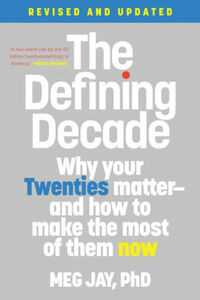Take a photo of a barcode or cover
2.75k reviews for:
The Defining Decade: Why Your Twenties Matter—And How to Make the Most of Them Now
Meg Jay
2.75k reviews for:
The Defining Decade: Why Your Twenties Matter—And How to Make the Most of Them Now
Meg Jay
You can feel this book has been written by an American - it pushes the work hard & grind culture of full time+ hours a week. Overall, the author comes across as quite condescending and judgmental towards her clients.
There are some good messages, like about being intentional about your life timeline and career choices, e.g. how it's better to have a starter job that leads somewhere than maybe a slightly nicer in the moment job that leads nowhere, as well as intentionality of dating and the willingness to work things out, rejecting the notion that your twenties are just practice years for dating.
Overall, I guess the book is for people that feel like their twenties are in all ways just a decade for fun and nothing serious - however, as a twentysomething, I hardly ever (if ever!) meet people who think like that. People are stressed, have big girl/boy jobs right out of uni and if they don't - they're stressed about not having them and job security in the future. People feel behind at 20, 21, 22, and especially in their mid-twenties. And all these people likely don't need this book too much at all! I'm wondering if this is a response to some more American-specific cultural phenomenon.
There are some good messages, like about being intentional about your life timeline and career choices, e.g. how it's better to have a starter job that leads somewhere than maybe a slightly nicer in the moment job that leads nowhere, as well as intentionality of dating and the willingness to work things out, rejecting the notion that your twenties are just practice years for dating.
Overall, I guess the book is for people that feel like their twenties are in all ways just a decade for fun and nothing serious - however, as a twentysomething, I hardly ever (if ever!) meet people who think like that. People are stressed, have big girl/boy jobs right out of uni and if they don't - they're stressed about not having them and job security in the future. People feel behind at 20, 21, 22, and especially in their mid-twenties. And all these people likely don't need this book too much at all! I'm wondering if this is a response to some more American-specific cultural phenomenon.
Some good thoughts and information, but potentially a bit stereotypical and outdated. It did help me realise the importance of.priotisinh Some things, but I don't think it's a "guide" by any means. Just a book of a lot of other people's experiences.
informative
inspiring
reflective
medium-paced
hopeful
informative
medium-paced
informative
inspiring
reflective
medium-paced
I just turned 24 and this book changed my life. I want to read this again every year, to make sure I'm on the right path. I can't recommend this enough.
challenging
hopeful
informative
inspiring
reflective
fast-paced
informative
inspiring
medium-paced
I found this book both reassuring and petrifying. I learnt quite a few things that weren’t directly related to growing up—some more psychological in nature, which makes sense given that the author is a psychologist. However, I think the main audience for this book is people in their late twenties, as the author emphasizes the importance of acting now before it’s too late. Since I’m only on the verge of turning 20, some parts didn’t really apply to me, but the message was still clear: it’s best to start thinking about and shaping your future as quickly as possible. The advice provided felt practical—while Jay occasionally suggested that anything is possible, she grounded it with the reminder that nothing will happen on its own. I appreciated that balance, and some of the stats she included were genuinely eye-opening. That said, a few sections felt extremely dated, especially the one about Facebook. It was both funny and a little frightening, considering the book was published only 13 years ago.

